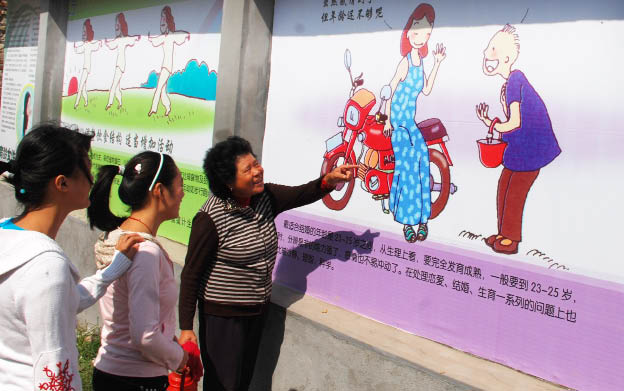Challenges Loom Large for China’s Population Policy
By staff reporter LI YUAN
CHINA’S population policy is in the headlines again, thanks to a report on China’s demographic challenges issued in late October 2012 by the China Development Research Foundation. The scholars who formulated the report recommend changes be made to the country’s current policy, notably that couples should gradually be allowed to have two children.
Recent years have seen a greater number of people advocating a “two-child” policy for China as the country’s population starts to age more rapidly. Currently people aged 65 years and older account for 9.1 percent of China’s population. This proportion is predicted to exceed 15 percent in 2027 and 20 percent in 2035.
In July 2012 a public suggestion made by the Social Development Research Section of the Development Research Center under the State Council stated, “The benefits China’s population policy brings to society are vanishing rapidly, and the growing aged population and potential future labor shortages will pose grim challenges to the country. Therefore, adjustments to the current family planning policy should be made as soon as possible,” or “an unpleasant situation will develop.”
 |
| Informative and vivid family planning posters in a remote village in Shuiquan Township, Shandong Province. |
Childbirth Situation
Zhang Lili found herself pregnant for the second time in April 2003. She was 34 years old and her firstborn was five. It was an unexpected pregnancy, and the couple found themselves in violation of the nation’s family planning policy.
Zhang consulted a doctor about having an abortion. It was early 2003, and China was in the grip of the SARS epidemic. The doctor warned her that hospital visits and operations were not without risk of contracting the SARS disease and advised her to avoid an abortion and keep the baby. Zhang took the advice and in January the following year gave birth to a second, healthy child, this time a boy.
Zhang resigned from her job in a state-owned business and became a fulltime mother and housewife. But her personal sacrifice was not without compensation. Walking the street or at gatherings with friends, Zhang and her two children often drew admiring – some might say jealous – gazes from single-child families.
According to an online survey on childbirth conducted by China Youth Daily, of the 6,000 respondents, 77.5 percent regarded two parents and two children as the “ideal” family size.
In September 1982, the Chinese government established family planning as basic national policy. Two months later, an amendment was added to the Constitution, which read: “Spouses are obliged to carry out family planning.” Since that time, the population control policy has been implemented nationwide.
Violators of the family planning law are obliged to pay large sums of what is called the “social support fee,” a penalty on their “extra use” of limited natural and social resources. The amount varies from place to place, and is usually three to six times local per capita annual income. Those who don’t pay the fee cannot register their newborn for a hukou, or registered permanent residence. Without a hukou, things will be very difficult for the child. Attending public schools and receiving social security benefits become impossible, for example. Zhang paid RMB 200,000 (US $32,000) to have her second child registered as a resident of Beijing.
While there are those who flaunt the family planning policy, many defend it as necessary to China’s development. The One Child Policy has eased population pressures in the world’s most populous country, and helped its economy to grow. For the majority Chinese families the policy means they can concentrate their limited incomes on giving their child a better education and better life.
If China had not established its family planning policy 30 years ago, the world today would have 400 million more mouths to feed. The impact of this added population on resources, land and food prices, among other things, would have been enormous. The United Nations Population Fund has praised China for family planning achievements that have helped stabilize the world’s human population.
Turning Point
China’s current family planning policy started with a public letter published in the People’s Daily in September 1980, which called on Communist Party and Youth League members to set an example by having only one child.
“The public letter was a very frank assessment of China’s potential population woes, and called on Party and Youth League members to take action,” said Gu Baochang, a professor of demography at Renmin University.
“Given the situation in the 1970s and 1980s when many Chinese families were living in hunger and poverty, getting rapid population growth under control by making family planning compulsory for all people was a necessary step,” Gu said.

